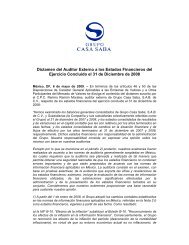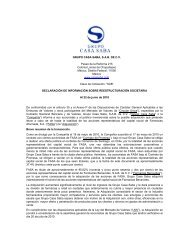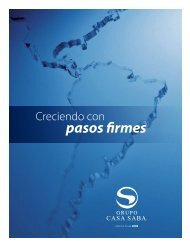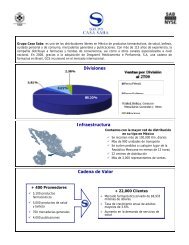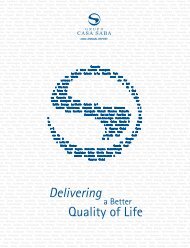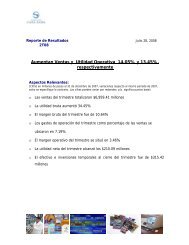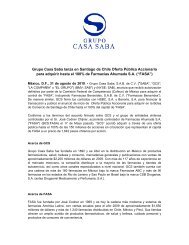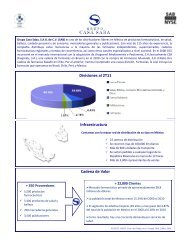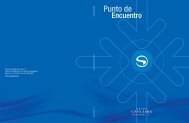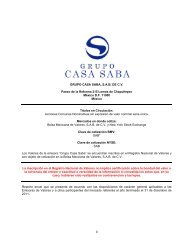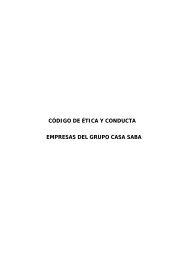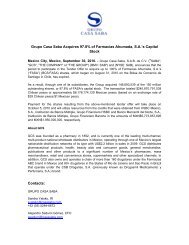FORM 20-F Grupo Casa Saba, S.A.B. de C.V.
FORM 20-F Grupo Casa Saba, S.A.B. de C.V.
FORM 20-F Grupo Casa Saba, S.A.B. de C.V.
You also want an ePaper? Increase the reach of your titles
YUMPU automatically turns print PDFs into web optimized ePapers that Google loves.
Implementation of IFRS.<br />
As <strong>de</strong>scribed in our Note 21 to our audited consolidated financial statements, we have adopted IFRS for the preparation of our financial information beginning in <strong>20</strong>12. Pursuant to<br />
current SEC reporting requirements, foreign private issuers may provi<strong>de</strong> in their SEC filings financial statements prepared in accordance with IFRS, without reconciliation to U.S. GAAP.<br />
The consolidated financial statements that we issue for the year ending December 31, <strong>20</strong>12 will be our first annual financial statements prepared in accordance with IFRS. Our IFRS<br />
transition date is January 1, <strong>20</strong>11, and accordingly, the year en<strong>de</strong>d December 31, <strong>20</strong>11 will constitute part of the comparative period covered by IFRS 1, “First-Time Adoption of<br />
International Financial Reporting Standards” (which we refer to as IFRS 1). We have therefore applied all mandatory exemptions and certain optional exemptions from the retrospective<br />
application of IFRS provi<strong>de</strong>d by IFRS 1.<br />
The Group applied the relevant mandatory exceptions to retrospective application of IFRS as follows:<br />
Attributed cost<br />
An entity may elect to measure an item or all of property, plant and equipment, as well as certain intangible assets at the transition date at its fair value and use that fair value as its<br />
attributed cost at that date. In addition, a first-time adopter may elect to use a previous GAAP’s revaluation of an item of property, plant and equipment at, or before, of the transition<br />
date as attributed cost at the date of the revaluation, if the revaluation was, at the date of the revaluation, broadly comparable to: (i) fair value; or (ii) cost or <strong>de</strong>preciated cost in<br />
accordance with IFRS, adjusted to reflect changes in a general or specific price in<strong>de</strong>x. The Group has adopted the following criteria:<br />
● For real property, use a revaluation un<strong>de</strong>r GAAP at a date prior to the date of transition as attributed cost;<br />
● for minor property and equipment and certain intangibles, use their values restated in accordance with GAAP at a date prior to the transition as an attributed cost.<br />
● for in<strong>de</strong>finite-lived intangible assets (tra<strong>de</strong>marks), use the fair value related to the acquisition of FASA, which was completed in October <strong>20</strong>10.<br />
Employee Benefits:<br />
At the transition date, the Company will apply IAS 19, “Employee benefits” (revised), which eliminates the use of the "corridor method” that tends to <strong>de</strong>fer actuarial gains and losses,<br />
and it is required to be recor<strong>de</strong>d in other items of comprehensive income. Therefore, the Company will recognize actuarial gains and losses existing at the date of transition against the<br />
opening balance of retained earnings. As of the transition date, the Company will recognize the effect of all actuarial gains and losses in "other comprehensive income" when accrued.<br />
In the transition date, the Company will eliminate the liability of termination benefits due to a cause other than restructuring un<strong>de</strong>r Mexican FRS against retained earnings. Un<strong>de</strong>r IAS<br />
19, this item is recognized when the entity has the legal obligation with its employees. If not, its effect is recor<strong>de</strong>d in income as accrued.<br />
Accumulated translation differences<br />
At the transition date, the Company will reverse the accumulated effect of translation gains or losses generated un<strong>de</strong>r Mexican FRS. Therefore, the Company will transfer the balance of<br />
the "Accumulated translation effect" against the opening balance of retained earnings as of the transition date. This reclassification would not affect the balance of stockhol<strong>de</strong>rs’<br />
equity.<br />
Investments in subsidiaries, jointly controlled entities and associates<br />
IFRS 1 allows for valuing these investments as of the transition date as indicated below, provi<strong>de</strong>d that the entity selects the “cost mo<strong>de</strong>l”:<br />
●<br />
●<br />
at cost, <strong>de</strong>termined in accordance with IAS 27, "Consolidated and individual financial statements"; or<br />
at the attributed cost that can be: (i) fair value un<strong>de</strong>r IAS 39, "Financial Instruments: Recognition and Measurement" as of the transition date in the individual financial<br />
statements of the entity; or carrying value on that date un<strong>de</strong>r prior GAAP.<br />
87



